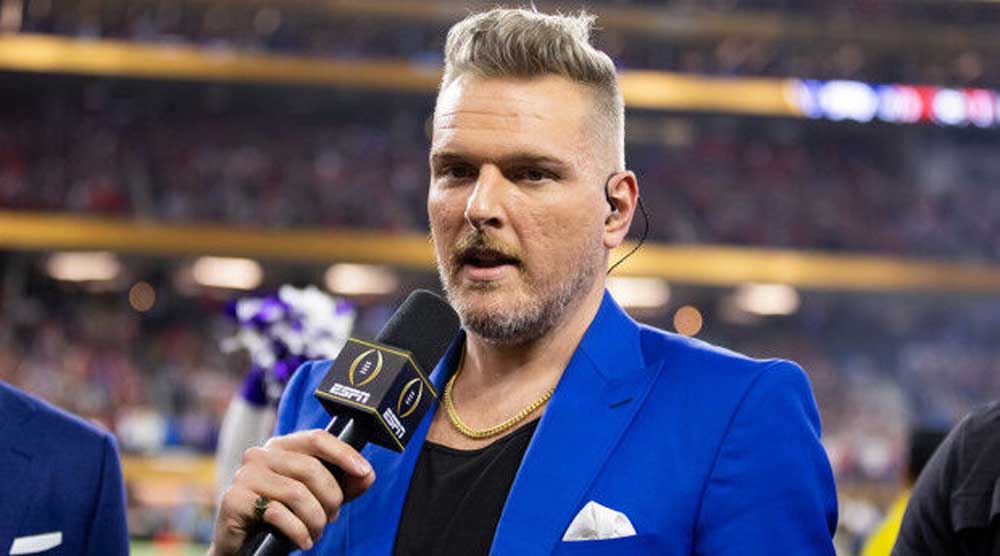ESPN knew Pat McAfee would bend the rules. Then he blew them up.
Published 9:50 am Friday, January 12, 2024

- YouTube star Pat McAfee joined ESPN’s “First Take” for a weekly lineup spot last year.
Before they hired Pat McAfee, ESPN executives made a decision: They couldn’t change the YouTube star.
The tank-top-wearing former punter would by definition need to be handled differently than anyone who had ever worked for the sports media giant. It was crucial, executives all the way up to Chairman Jimmy Pitaro thought, that McAfee help ESPN reestablish its cachet with younger sports fans.
So ESPN made concessions. They licensed McAfee’s show, which gave them less oversight of content; they allowed profanity; they blessed McAfee’s tank tops. Executives also discussed how they would deal with the fallout when McAfee inevitably said something that drew public scrutiny, including insulting a business partner like the NBA or NFL.
Some inside ESPN hoped to duplicate the sort of diplomatic immunity seemingly enjoyed by Charles Barkley, the face of TNT’s NBA coverage. McAfee, they thought, could eventually be like Barkley: loud and opinionated, but also granted a get-out-of-jail-free card to say things others couldn’t.
The network knew there would be some growing pains — a few news cycles that would test those limits. The past two weeks, though, went beyond anything the network troubleshooted.
One of his paid guests, star quarterback Aaron Rodgers, made inferences about Jimmy Kimmel’s connection to the serial abuser Jeffrey Epstein. Rodgers returned to the show and said he had not called Kimmel a pedophile but didn’t apologize — before launching into a 20-minute rant about vaccine efficacy. McAfee, meanwhile, called a longtime senior executive a “rat” on ESPN’s airwaves.
In between, there were cryptic tweets from McAfee with clips from “Scarface” and a seven-minute monologue by Kimmel — whose late-night ABC show, like ESPN, is part of the Disney family — in which he called Rodgers “too arrogant to know how ignorant he is.”
ESPN’s and Disney’s top executives were silent through it all, but on Wednesday, McAfee announced Rodgers would not return to his show this season, and McAfee later issued a long missive on social media. (Rodgers then made a brief football-focused appearance Thursday.)
“I certainly don’t love that I’ve found myself in political wars and public beefs because of something that a guest has said on our show or something that my dumb a — has said,” McAfee wrote. “I think what I’ve come to realize is that it’s gonna come with the territory of this venture. We are much more aware of that now.”
Personality-driven industry
The weeklong episode was among the most fractious in the network’s history and has left plenty inside ESPN’s Bristol, Connecticut, campus thinking both about McAfee’s future, the network’s, and whether his ascension — and defiance — signals a new era for the TV behemoth.
This story is based on interviews with nearly a dozen people in and around ESPN, including current and former employees and executives, most of whom spoke on the condition of anonymity, fearing professional repercussions. ESPN declined to comment.
McAfee sits at the intersection of two fundamental questions for ESPN. The first is as old as the network: whether its power lies in its platform or the talent. The second is whether it is possible for ESPN to be both a TV network and a cutting-edge digital and streaming platform.
In one of his segments last week, McAfee lambasted an old guard at ESPN that he said is out to get his show, calling them “old hags.” He named a particular executive, Norby Williamson, publicly accusing him of “sabotaging” the show by playing a role in a story in the New York Post about his flagging linear TV ratings.
ESPN has a history of suspending talent who have spoken out against colleagues or the company, from Tony Kornheiser to Keith Olbermann to Bill Simmons. Williamson, a polarizing figure at ESPN, has never been shy about his belief that talent is subservient to the ESPN brand, and he famously clashed with stars Stuart Scott and Jemele Hill. Last week, former ESPN host Dan Le Batard suggested Williamson had played a role in his exit from ESPN, too.
The current media landscape is more fractured, but the biggest stars at ESPN — most notably Stephen A. Smith — have been given higher and higher salaries, more latitude to pursue outside projects and to talk about whatever they want. Smith reportedly earns $12 million a year; McAfee reportedly is at $15 million with 4½ years left on the deal that began in the fall.
McAfee has gotten away with testing the limits, at least for now, because Pitaro and ESPN made an enormous bet on him. An ESPN executive with a digital background, Mike Foss, told The Post last week that the future of ESPN will be driven by people like McAfee. “As you turn to direct-to-consumer … it’s a personality-driven industry way more than a brand-driven industry,” he said.
Olbermann, the former “SportsCenter” anchor who hosts the “Countdown” podcast, wondered if McAfee cared at all about ESPN.
“I do not begrudge Pat McAfee his success, and I don’t dare to criticize his style that got him here,” Olbermann said. “But I don’t think he gives a damn about ESPN as an institution or what it has to maintain to be as successful as it is now, much less stave off the deterioration of cable. If that wasn’t obvious beforehand, it was obvious this week.”






